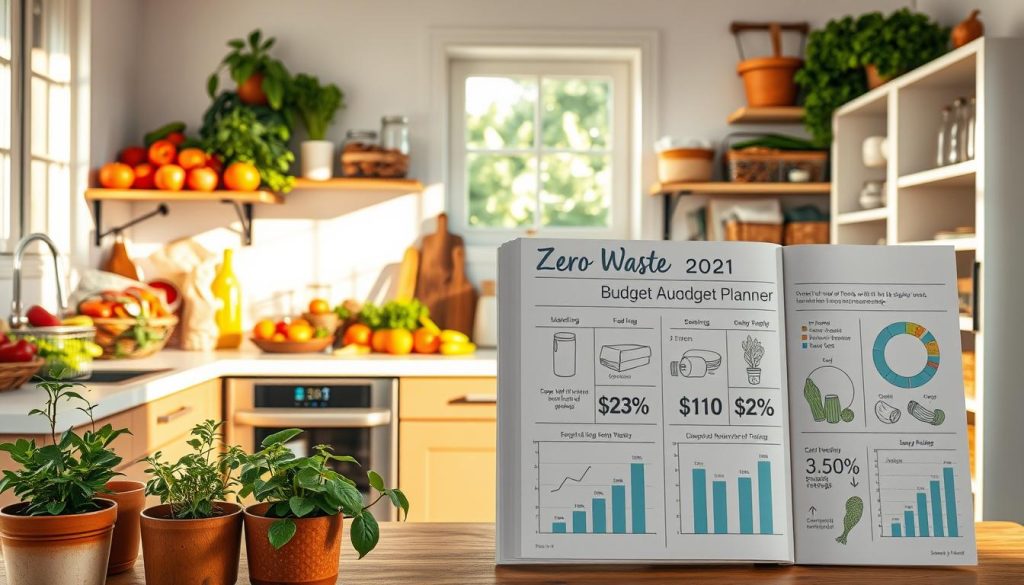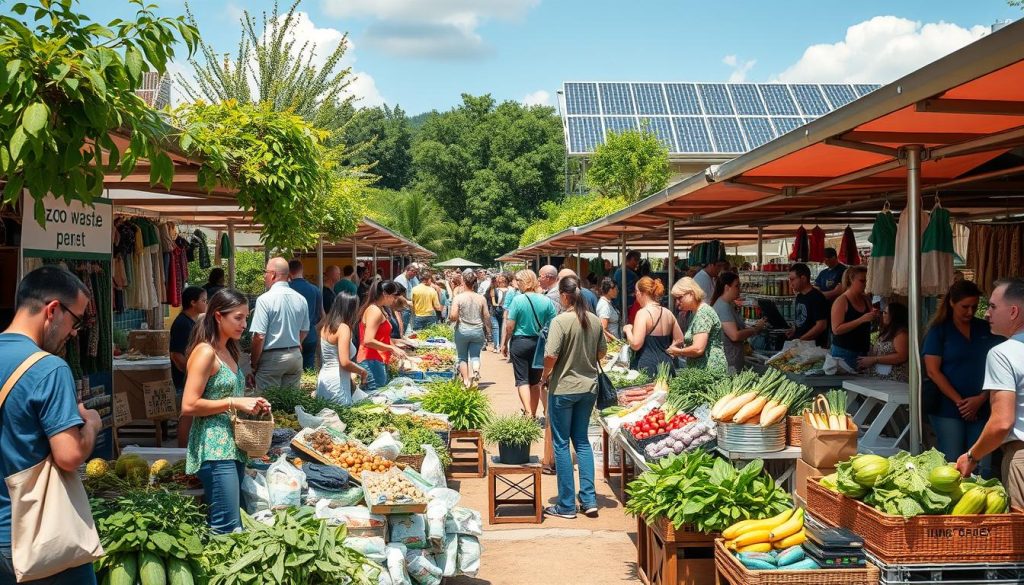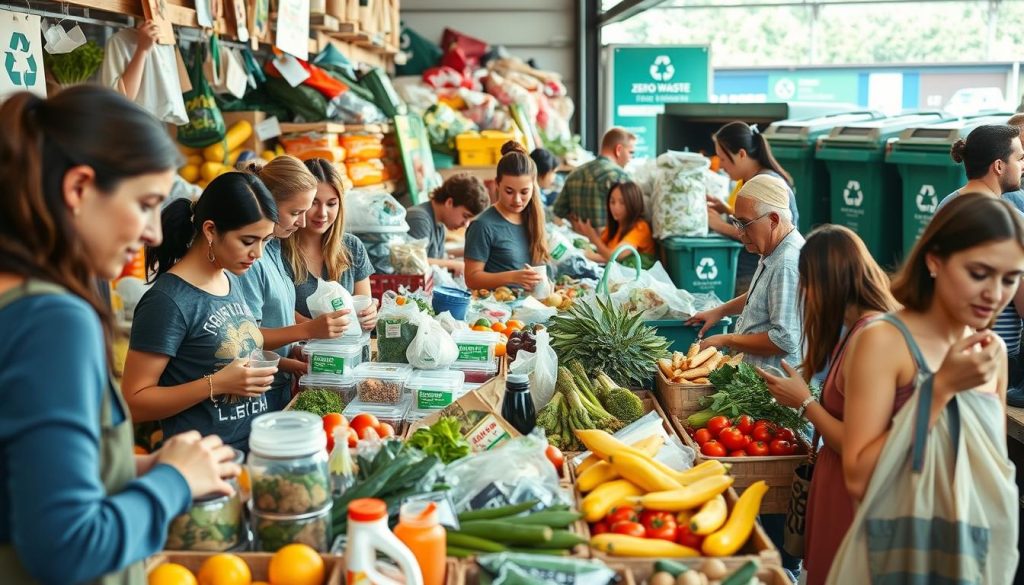Living zero waste is good for the planet and your wallet. It helps you save money by cutting down on waste. This change also benefits local and global economies.
By choosing to live zero waste, you make a big difference. It’s not just about saving money. It’s also about making a positive impact on the world.
In this article, we’ll explore how zero waste living affects your finances. We’ll also see how it helps communities and supports long-term economic health.
Understanding Zero Waste Living
Starting a zero waste journey might seem tough at first. But, the benefits are huge.
My Journey to Embrace Zero Waste
At first, I was unsure about zero waste living. But, learning more showed me its environmental and financial perks. Changing my ways took time and effort, but it was worth it.
My grocery bills went down as I bought in bulk and used reusable items. This saved me money and helped the planet.
Core Principles of Zero Waste
Zero waste living is based on three main ideas: reusing, recycling, and composting. By following these, I cut down my waste a lot. Using jars again, composting food scraps, and recycling helped a lot.
These actions are good for the planet and reduce waste. They also help us live better.
Benefits Beyond the Wallet
Zero waste living does more than save money. It makes us feel responsible and creates a healthier home. It also improves our health by avoiding harmful products and clutter.
Supporting local, eco-friendly businesses adds to the joy. It helps our community grow in a sustainable way.
Financial Savings Through Waste Reduction

Living zero waste can save you money. Making smart changes can improve your finances. Here are some ways zero waste living can cut costs.
Cutting Down on Purchase Costs
Zero waste living cuts down on what you buy. Buying less and choosing bulk items saves money. Supermarkets often lower prices on loose items, and buying in bulk saves money over time.
Savings from DIY Alternatives
DIY alternatives also save money. Making your own cleaning supplies, personal care items, and food saves money. Using common ingredients for DIY projects can lead to big savings.
Reduced Waste Disposal Fees
Reducing waste also saves on disposal fees. Recycling and composting mean less trash to throw away. This saves money on waste management services.
The Impact on Local Economies

Practicing zero waste does more than help us personally. It also supports local economies, creates jobs, and boosts community spirit.
Supporting Local Businesses
Zero waste helps local businesses thrive. By choosing local products, we keep money in our community. This supports business owners and helps our economy grow.
Job Creation in Sustainable Practices
Sustainable living creates jobs too. It needs people for waste management, green products, and recycling. These jobs help local economies by offering steady work.
Community Engagement and Participation
Zero waste also brings people together. Joining local initiatives builds community spirit. Events like clean-ups and workshops help us work towards a greener future together.
Understanding zero waste’s impact on local economies makes our communities stronger. It shows we value both sustainability and economic growth.
How Zero Waste Affects Consumer Behavior

Living a zero waste life changes how we shop and use things. It makes us think more about what we buy and how it affects the planet and our wallets. This lifestyle helps us be more mindful of our choices.
Shifting Mindsets Towards Sustainability
Starting a zero waste life changes how we think. I began to think about every purchase more carefully. I looked at the immediate use and the long-term effects on the environment.
This made me spend more wisely, avoiding impulse buys. I chose items with less packaging or those I could use again. This saved me money over time.
The Role of Education in Financial Decisions
Learning is key to making smart money choices that fit with zero waste living. Knowing the benefits of sustainable living, like saving on waste and making products last longer, helps us see the financial gains. Education helps us make better choices, leading to a healthier planet and economy.
Transitioning to Eco-Friendly Products
Starting a zero waste journey often means switching to eco-friendly products. At first, these items might seem pricier than usual. But, looking closer, we see the big savings and benefits for our planet.
Initial Investment vs. Long-Term Savings
Some might think buying reusable items is too expensive. Things like stainless steel water bottles or organic cotton bags cost more than disposable ones. Yet, their lasting quality means you spend less money in the long run.
| Product Consideration | Initial Cost | Longevity | Cost Over Time |
|---|---|---|---|
| Stainless Steel Water Bottle | $25 | 10+ years | $25 |
| Single-Use Plastic Bottles (Yearly) | $1/bottle | 1 use | $365/year |
This table shows how buying quality upfront can save you money in the long run.
Value of Quality Over Quantity
Choosing quality over quantity saves money and helps the environment. For example, a set of metal straws might seem pricey at first. But, they last a long time, making them a smart buy.
Valuing quality means less waste and a healthier planet. It also supports a strong economy. This way of living encourages us to think more about our choices and their lasting effects.
Measuring the Economic Benefits
Switching to a zero waste lifestyle cuts down on environmental harm and saves money. I’ve seen the economic benefits of zero waste practices by tracking my spending and looking at case studies.
Tracking Personal Financial Changes
I started watching my spending closely after adopting zero waste living. I saved a lot, especially on groceries and household items. A zero waste budget helped me focus on what I really need, cutting down on unnecessary buys.
The savings were clear in a few months. This showed me the lasting economic benefits of zero waste practices.
Case Studies of Zero Waste Implementation
Looking at case studies gives us a better view of zero waste’s benefits. Companies like Unilever have cut costs by reducing waste. Households also save money by using items over and over again and avoiding single-use products.
These stories highlight the zero waste budgeting benefits. They offer lessons for those thinking about this green lifestyle.
The table below shows how much money you can save with zero waste practices in a year:
| Zero Waste Practice | Monthly Savings | Annual Savings |
|---|---|---|
| Homemade Cleaning Solutions | $15 | $180 |
| Buying in Bulk | $40 | $480 |
| Reusable Kitchen Items | $20 | $240 |
These practices together lead to big savings. This proves the economic and budgetary perks of a zero waste lifestyle.
The Bigger Picture: Economic Sustainability
Thinking about zero waste living means looking at the big picture. It’s not just about saving money for ourselves. It’s about how it helps our society save money too. By cutting down on waste, we save money on waste management and fixing environmental problems.
Long-Term Environmental Cost Savings
One key benefit of living sustainably is saving money for the environment. Landfills and waste systems cost a lot to keep up. Pollution cleanup is expensive too. Zero waste living helps reduce these costs, making our environment healthier and our economy stronger.
The Role of Government in Zero Waste Initiatives
Governments are key in pushing for zero waste living. They use incentives like tax breaks and grants to help. They also make rules to encourage recycling and reduce single-use plastics.
Encouraging Policy Changes for Sustainability
To make zero waste living common, we need policy changes. Local and federal governments can make a big difference. For example, cities can make recycling rules stricter. Federal policies can aim to reduce waste in industries. These changes help us build a sustainable future.
